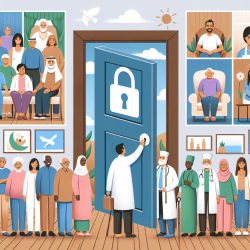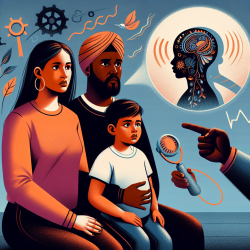The landscape of mental health care is complex, particularly when it comes to addressing the needs of racialized immigrant older adults. Despite Canada's universal health coverage, significant disparities exist in the accessibility and quality of mental health services available to these communities. A recent study titled Inequities in Mental Health Care Facing Racialized Immigrant Older Adults With Mental Disorders Despite Universal Coverage: A Population-Based Study in Canada sheds light on these challenges and offers valuable insights for practitioners looking to improve their skills and service delivery.
The Challenges Faced by Racialized Immigrant Older Adults
The study highlights several critical issues faced by racialized immigrant older adults with mental disorders. Compared to Canadian-born Whites, these individuals have greater mental health needs but are less likely to access necessary services. Key findings include:
- Higher odds of poor/fair self-rated mental health.
- Increased perception of life as stressful.
- Higher prevalence of psychiatric comorbidities.
- Significant unmet needs for mental health care.
Despite these increased needs, racialized immigrants are less likely to have consultations with family doctors, psychologists, and social workers. The exception is psychiatrist visits, which do not show a significant disparity.
Strategies for Practitioners
To address these inequities, practitioners can adopt several strategies:
Culturally Responsive Care
Culturally responsive care is essential in meeting the unique needs of racialized immigrant older adults. Practitioners should be trained to understand cultural differences and incorporate them into their treatment plans. This includes recognizing traditional healing practices and integrating them into the care process where appropriate.
Multilingual Services
Language barriers are a significant obstacle to accessing mental health services. Providing multilingual services or employing interpreters can help bridge this gap and ensure that patients fully understand their treatment options and feel comfortable communicating their needs.
Community Engagement
Engaging with community leaders and organizations can help build trust and encourage the use of mental health services among racialized immigrant communities. Community-based programs that raise awareness about mental health issues and available resources can also play a crucial role in reducing stigma and promoting help-seeking behaviors.
Advocacy for Policy Change
Practitioners can advocate for policy changes that expand insurance coverage to include a broader range of mental health services. This includes advocating for funding for alternative healing practices that align with the cultural beliefs of immigrant communities.
The Role of Further Research
This study underscores the need for further research into the intersectionality of race, migration, and age in shaping mental health care experiences. By exploring these intersections more deeply, researchers can identify additional barriers and develop targeted interventions to improve access to care.
Practitioners are encouraged to stay informed about ongoing research in this area and consider how new findings can be applied to their practice. Attending conferences, participating in webinars, and engaging with professional networks are excellent ways to keep up-to-date with the latest developments.
A Call to Action
The challenges faced by racialized immigrant older adults in accessing mental health care are significant but not insurmountable. By implementing culturally responsive practices, providing multilingual services, engaging with communities, and advocating for policy changes, practitioners can make a meaningful difference in the lives of these individuals.
For those interested in delving deeper into this topic, I highly recommend reading the original research paper: Inequities in Mental Health Care Facing Racialized Immigrant Older Adults With Mental Disorders Despite Universal Coverage: A Population-Based Study in Canada.










